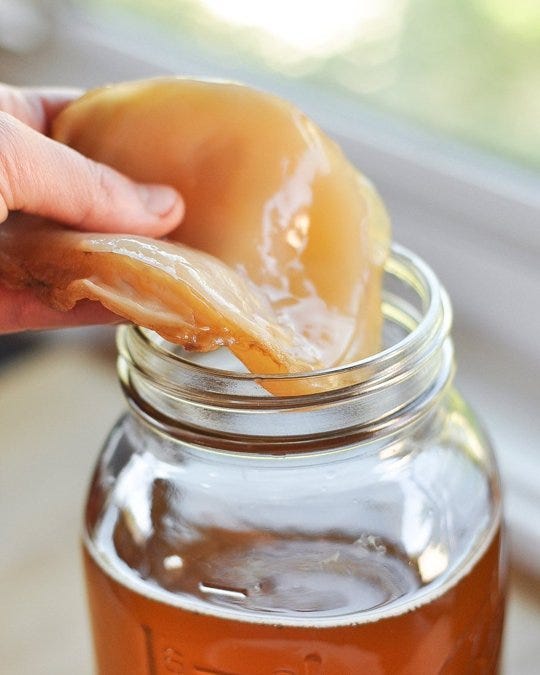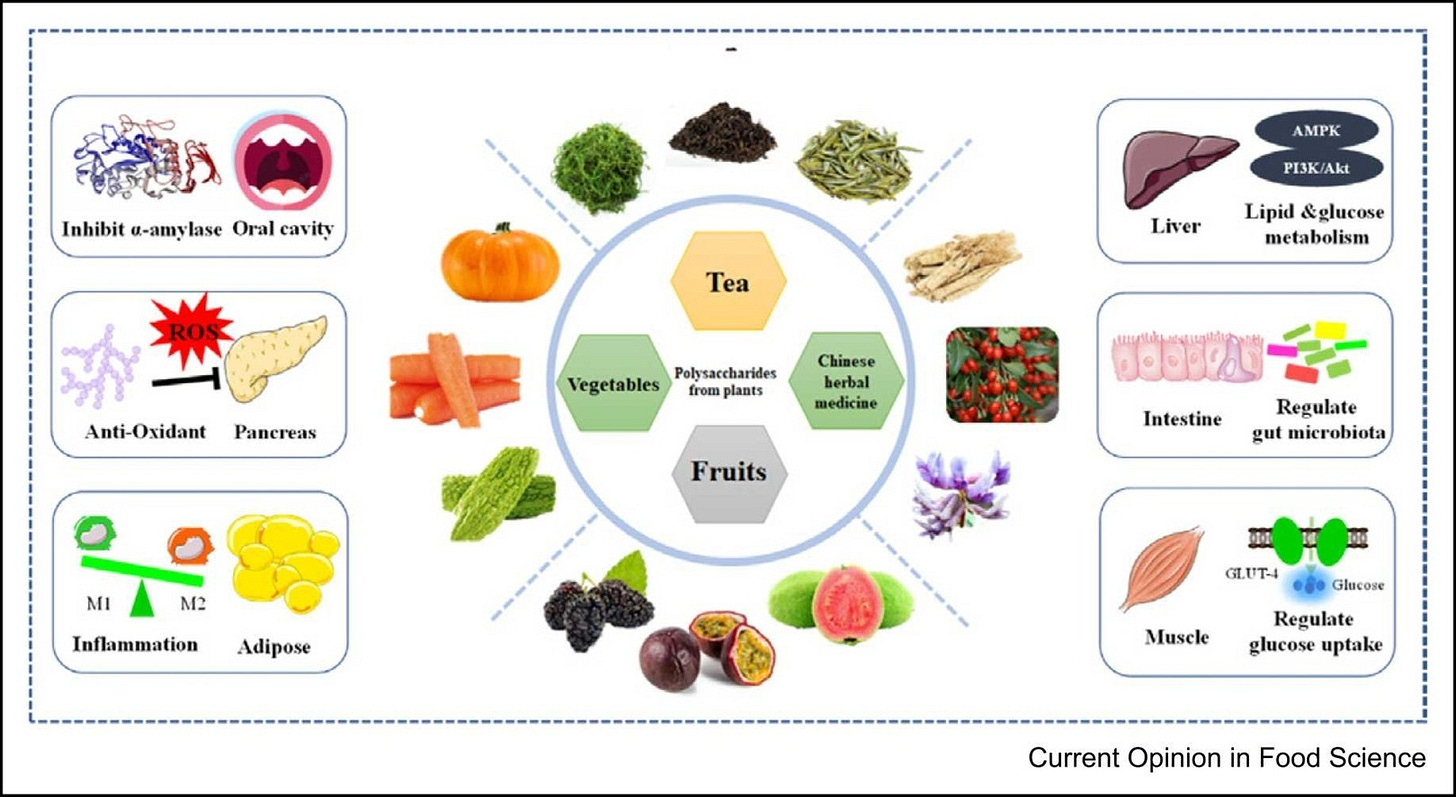Azuki Bean Tea, Kombucha, Wasabi - good food for cognition and metabolism
More evidence that Food is Medicine.
Several of my past newsletters outlined the health benefits from ingesting ‘good foods’ :
Cider and Sauerkraut: Octoberfest: let us extol the virtues of sauerkraut and cider
Beer: July 4 BBQ: a Beer Belly can be good. Enjoy some brewskis with your brats
Kimchi: Get skinny with Kimchi
Bread: Brazilian bread prevents asthma and Constipation? Give us this day our daily bread.
… and now we have more items to add to the list. Recent research highlights two teas and a condiment that you should consider for your daily consumption.
Azuki Bean Tea
Teas extracted from steeping roasted red azuki beans in boiling water, can be helpful in metabolizing sugars, and reducing high blood pressure.
A study in rats supports use in diabetes.
A hot water extract obtained by boiling adzuki beans (Vigna angularis) to produce bean paste for Japanese cake showed inhibitory activity against alpha-glucosidase, alpha-amylase, maltase, sucrase, and isomaltase after HP-20 column chromatography. The IC50 values for each hydrolylase were 0.78 mg/ml ( a-amylase), 2.45 mg/ml (maltase), 5.37 mg/ml (sucrase), and 1.75 mg/ml (isomaltase). The active fraction showed potential hypoglycemic activity in both normal mice and streptozotocin (STZ)-induced diabetic rats after an oral administration of sucrose, but did not show any effect on the blood glucose concentration after glucose administration, suggesting that the active fraction suppressed the postprandial blood glucose level by inhibiting a-glucosidase and a-amylase, irrespective of the endogenous blood insulin level. -T Itoh et al
Another rodent study shows benefit in hypertension:
1. Hypertension is a major risk factor for myocardial infarction and renal damage, and it has also been shown to have pro-inflammatory actions that increase the formation of reactive oxygen species. Macrophage infiltration has been suggested to play a role in the pathogenesis of hypertension. Azuki beans are known to contain pro-anthocyanidins, a group of polyphenolic bioflavonoids with remarkable radical-scavenging activities in vitro. Therefore, the aim of the present study was to investigate the effect of polyphenol-containing azuki bean extract (ABE) on systolic blood pressure (SBP) and macrophage infiltration in the heart and kidney of spontaneously hypertensive rats (SHR). 2. Spontaneously hypertensive rats and control normotensive Wistar-Kyoto (WKY) rats were divided into two groups fed either 0 or 0.8% ABE in their diets. Tail SBP and macrophage kinetics in the heart and kidney were examined. 3. The SBP of the SHR group was higher than that of age-matched WKY rats throughout the treatment period. After 8 weeks of treatment, the increased SBP in ABE-treated SHR was significantly less than that in untreated SHR. 4. Nicotinamide adenine dinucleotide (NADH) or nicotinamide adenine dinucleotide phosphate (NADPH)-stimulated superoxide (O2-) production was enhanced in the kidney and heart in SHR and WKY rats compared with levels in the absence of NADH or NADPH. The NADPH-stimulated superoxide (O2-) levels in the kidney in untreated SHR was significantly higher than that in untreated WKY rats. The (O2-) levels in ABE-treated SHR were significantly decreased compared with the untreated SHR group. 5. In immunohistochemical analyses, the number of macrophages in the heart and in the glomeruli and tubulointerstitium of the kidney was significantly higher in ABE-untreated SHR than in ABE-untreated WKY rats. Conversely, there was a significant decrease in the number of macrophages in ABE-treated SHR compared with the untreated SHR. There were significant positive correlations between SBP and the number of ED1-positive macrophages in the heart and tubulointerstitial and glomerular areas of the kidney in WKY rats and SHR. 6. In conclusion, the results of the present study suggest that ABE attenuates the elevation of SBP and macrophage infiltration in the heart, as well as in the glomeruli and tubulointerstitium of the kidney, in our SHR model. - S Sato, et al.
Kombucha Tea
The fermented tea, Kombucha, may be a source for long life, as indicated by studies in the experimental nematode, Caenorhabditis elegans. The tea’s yeast and bacteria colonize the worms' intestines and then induce changes in metabolism that mimic those that occur during fasting. These microbes alter the expression of genes involved in fat metabolism, leading to more proteins that break down fats and fewer proteins that build up triglycerides. Ultimately, the worms reduce their stores of fat.

Kombucha is a popular fermented tea that has been purported to have many human health benefits, including protection against metabolic diseases like diabetes and obesity. These health benefits are thought to be conferred by the probiotic microbes found in Kombucha Tea, which includes both bacterial and yeast species, that may be able to colonize the human intestine and alter host physiology. The mechanisms by which the Kombucha Tea-associated probiotic microorganisms (KTMs) impact host physiology are largely unknown. Using the nematode Caenorhabditis elegans as an animal model system to study the host physiological response to KTMs, we show that KTMs colonize the C. elegans intestine and impart widespread changes in the expression of evolutionarily conserved lipid metabolism genes, resulting in reduced fat levels in the host. The host metabolic response to actively fermenting KTMs requires an increase in proteins that break down lipids paired with a reduction in a protein that builds triglycerides, which mirrors the events that occur during fasting. These findings are consistent with the reported human health benefits of Kombucha Tea and provide new insights into the host response to Kombucha-associated microbes, which could inform the use of Kombucha in complementary health care approaches in the future. - RN DuMez-Kornegay, et al.
Wasabi Condiment
Good news for Baby Boomers: wasabi improves short- and long-term memory in older people. A double-blinded randomized controlled trial demonstrated benefit from regularly ingesting this condiment. [Mmmmm … I do love my sushi.]
Background: Cognitive functions decline with age. Declined cognitive functions negatively affect daily behaviors. Previous studies showed the positive effect of spices and herbs on cognition. In this study, we investigated the positive impact of wasabi, which is a traditional Japanese spice, on cognitive functions. The main bioactive compound of wasabi is 6-MSITC (6 methylsulfinyl hexyl isothiocyanate), which has anti-oxidant and anti-inflammatory functions. Anti-oxidants and anti-inflammatories have an important role in cognitive health. Therefore, 6-MSITC is expected to have positive effects on cognitive function. Previous studies showed the beneficial effects on cognitive functions in middle-aged adults. However, it is unclear that 6-MSITC has a positive effect on cognitive functions in healthy older adults aged 60 years and over. Here, we investigated whether 12 weeks’ 6-MSITC intervention enhances cognitive performance in older adults using a double-blinded randomized controlled trial (RCT). Methods: Seventy-two older adults were randomly assigned to 6-MSITC or placebo groups. Participants were asked to take a supplement (6-MSITC or a placebo) for 12 weeks. We checked a wide range of cognitive performances (e.g., executive function, episodic memory, processing speed, working memory, and attention) at the pre- and post-intervention periods. Results: The 6-MSITC group showed a significant improvement in working and episodic memory performances compared to the placebo group. However, we did not find any significant improvements in other cognitive domains. Discussion: This study firstly demonstrates scientific evidence that 6-MSITC may enhance working memory and episodic memory in older adults. We discuss the potential mechanism for improving cognitive functions after 6-MSITC intake. - R Nouchi, et al.
Wasabi is one of the agents able to decongest mucous membranes, and replace the banned drug products: Alternative Decongestants: FDA trashes phenylephrine oral products
And phenylephrine can drain the glymphatics into the cervical lymph chain: Mobilizing glymph to manage migraine. So maybe that is one way wasabi helps with memory and cognition?
~~~~~~~~~~~~~~~~~~~~~~~~~~~~~~~~~~~~~~~~~~~
Happy Octoberfest to one and all!
REFERENCES
T Itoh, et al. Suppressive Effect of a Hot Water Extract of Adzuki Beans (Vigna angularis) on Hyperglycemia after Sucrose Loading in Mice and Diabetic Rats. Biosci. Biotechnol. Biochem., 68 (12), 2421–2426, 2004
S Sato, et al. EFFECT OF POLYPHENOL-CONTAINING AZUKI BEAN (VIGNAANGULARIS) EXTRACT ON BLOOD PRESSURE ELEVATION ANDMACROPHAGE INFILTRATION IN THE HEART AND KIDNEY OF SPONTANEOUSLY HYPERTENSIVE RATS Clinical and Experimental Pharmacology and Physiology (2008) 35, 43–49 doi: 10.1111/j.1440-1681.2007.04743.x
RN DuMez-Kornegay, et al. Kombucha Tea-associated microbes remodel host metabolic pathways to suppress lipid accumulation. PLoS Genetics (2024). DOI: 10.1371/journal.pgen.1011003
R Nouchi, et al. Benefits of Wasabi Supplements with 6-MSITC (6-Methylsulfinyl Hexyl Isothiocyanate) on Memory Functioning in Healthy Adults Aged 60 Years and Older: Evidence from a Double-Blinded Randomized Controlled Trial, Nutrients (2023). DOI: 10.3390/nu15214608









Love this post. Don't forget milk kefir! Even people with lactose intolerance can take milk kefir because the cute little kefir scobies gobble up most of the lactose.
I have some hilarious stories of my Kombucha exploding when I'd bottle it. You have to be careful with that stuff! :))))